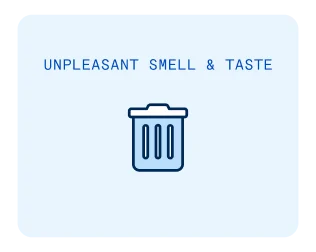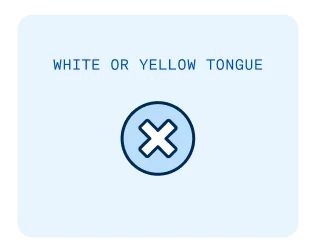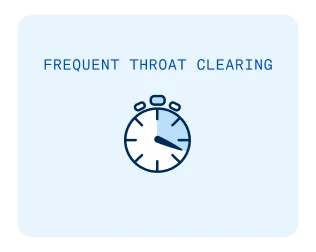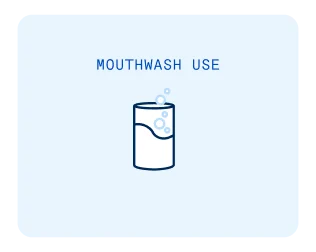Bad breath (halitosis)
If you’re ready to refresh your oral health, it may be time to address halitosis (or bad breath). Not to worry, halitosis affects many patients and we offer several dental solutions to help you minimize it.
Let’s walk through the causes, symptoms and treatments of bad breath.
Bad breath causes
There are multiple reasons why you may be struggling with halitosis. Here are a few of the most common causes of bad breath:
Oral health issues
Odor-producing foods
Dry mouth (xerostomia)
Smoking and using tobacco products
Certain medical conditions & medications
Sinus inflammation
Dentures
Symptoms of bad breath

Foul smell & taste
The most noticeable symptom of bad breath is the presence of a persistent odor coming from your mouth. You may also experience an unpleasant or metallic taste in your mouth.

Coated tongue
A white or yellowish coating on the tongue can be a sign of bad breath

Constant throat clearing
Some patient's that struggle with dry mouth or post nasal-drip find themselves frequently clearing their throat to alleviate the sensation of an unpleasant taste or odor

Frequent use of mouthwash
If you find yourself consistently reaching for mouth wash to cover the scent of your breath, you likely have halitosis or other dental conditions that is causing the persistent odor
How to get rid of bad breath
Halitosis (bad breath) can thankfully be alleviated through a customized care approach. Our goal at Aspen Dental is to identify the unique underlying causes to effectively eliminate your bad breath. Here’s a list of care options to eliminate bad breath:Level up your oral hygiene
We recommend brushing your teeth at least twice a day. While you’re taking care of your oral health, it’s also a good idea to use dental floss, a tongue scraper and mouthwash for bad breath to remove any access bacteria.
Address dry mouth
Stay hydrated throughout the day by drinking water regularly.
Adjust your diet
Limit odor-producing foods like garlic, onions, coffee and alcohol. Adding fruits and vegetables to your diet can also boost your oral health.
Stop smoking
Quit smoking and all tobacco use to drastically improve your breath and overall health.
Adjust medication
Discuss potential alternatives with your healthcare provider if your medications are what’s causing your dry mouth and bad breath.
Treat underlying medical conditions
It’s important to get to the root of the issue by addressing any underlying medical conditions that can cause bad breath, like sinus problems or diabetes.
Orthodontic and dental appliance care
Ensure proper cleaning and fitting of your clear aligners, dentures or other dental appliances to prevent bacteria from getting trapped.
Get your breath freshened professionally
Consider professional breath freshening treatments at your next check-up or as recommended by your dentist.

Nix bad breath at your next check-up
For the most effective solution to alleviate halitosis, (bad breath) speak to your Aspen Dental dentist at your next check-up. They’ll create a customized care plan to treat the cause of bad breath.
Bad breath (Halitosis) FAQs
What is Halitosis?
Halitosis, commonly known as bad breath, is when there’s a persistent odor coming from the mouth. Bad breath is often caused by bacteria that produce sulfur compounds. Although it's a common health concern, it can be managed through proper oral hygiene, adjusting your diet and consulting with your dentist.
How to get rid of bad breath permanently?
To get rid of bad breath permanently, it’s important to establish a consistent oral hygiene routine. This includes regular brushing, flossing and tongue cleaning. Additionally, take a look at possible underlying causes like gum disease, dry mouth and dietary factors. If bad breath persists, consult with your Aspen Dental dentist for personalized care advice.
What products can I use to get rid of bad breath?
To combat bad breath effectively, consider using products like an antimicrobial mouthwash, tongue scraper and sugar-free gum to freshen your breath and reduce bacteria in the mouth. Speak with your dentist for more information on products that can support your unique oral health.
Do cavities cause bad breath?
Yes, cavities can contribute to bad breath as they create an environment where bacteria thrive and produce foul-smelling odors. Addressing cavities through dental treatment can help eliminate this source of bad breath.
What are the types of bad breath smells?
Having bad breath can produce various smells, including an odor resembling rotten eggs, decay or something fruity. The smell depends on the underlying causes-which can be contributed to things like bacterial activity, oral infections or certain medical conditions. Identifying the specific smell can help you understand the root cause and treat it effectively.
Discover more for your smile
Ready for fresher breath?
Don’t let bad breath hold you back. Schedule an appointment at your local Aspen Dental office for welcoming, personalized dental care. Our team will help you effectively treat halitosis so you can get back to living life on your terms.
